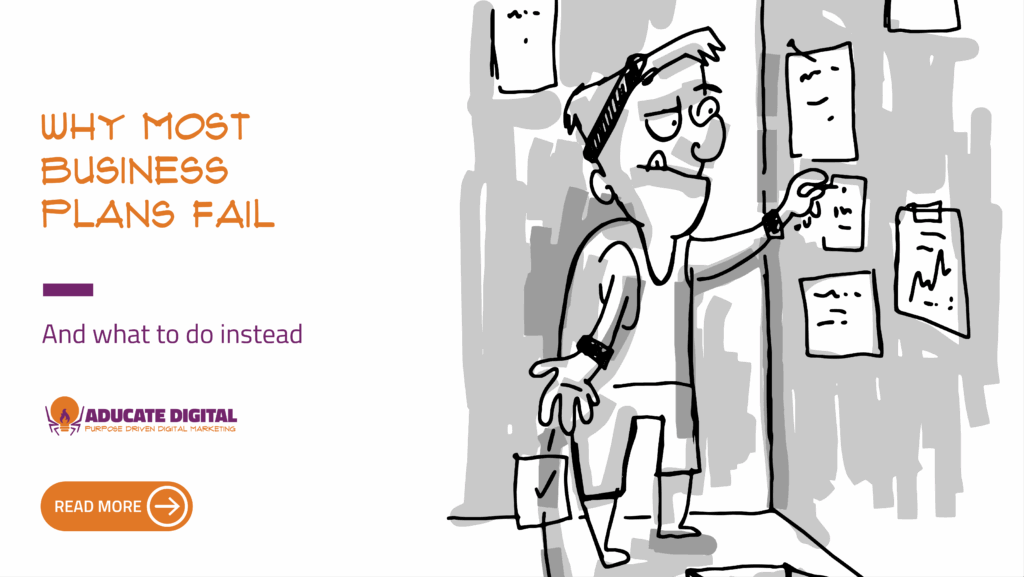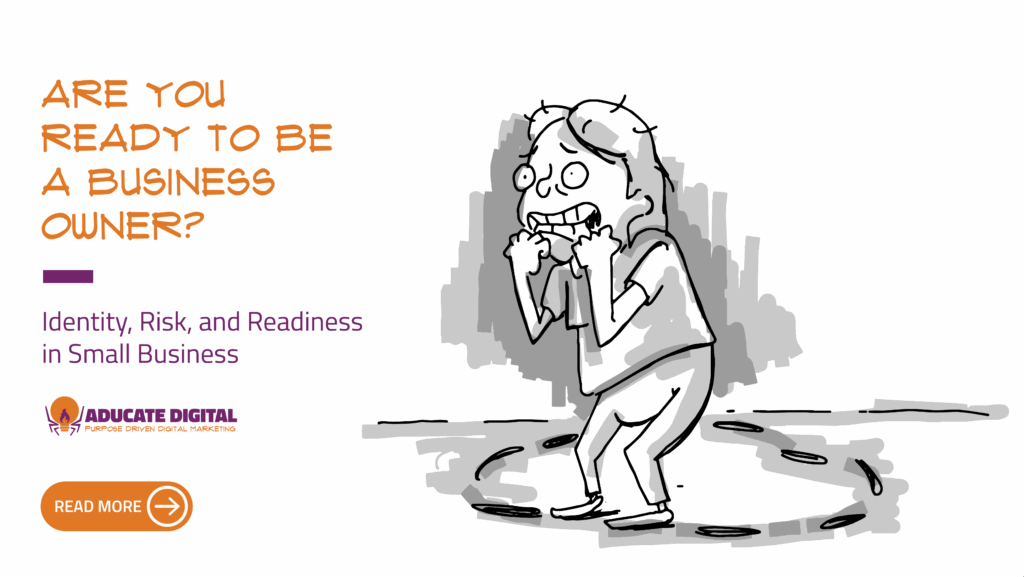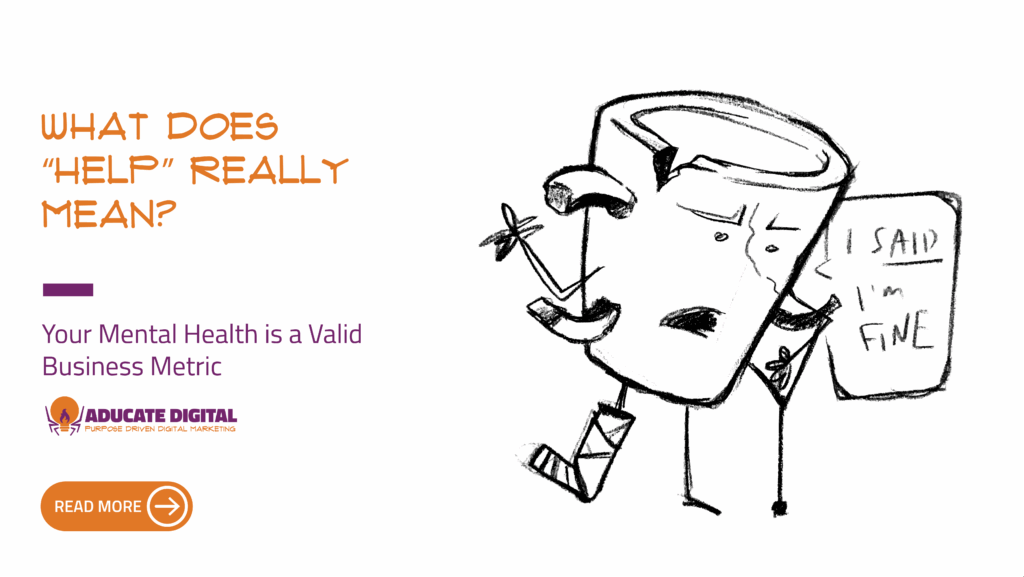
Quick Links
- The Paradox of Help
- Desired Outcome vs. Reality
- What Is Mental Health, Really?
- Redefining Help for Entrepreneurs
- Pragmatic Optimism: Tools for Sustainable Help
- From Awareness to Accountability
- A More Honest Definition of Success
Mission-driven entrepreneurs almost always start with the same impulse: I want to help people. Whether it’s helping a community thrive, clients grow, or individuals feel seen, “help” is the anchor point for many new businesses.
But here’s the paradox: what does “help” actually mean if you’re too exhausted, too anxious, or too depleted to show up fully?
This isn’t a rhetorical question. It’s the reality many business owners run into when they assume that “help” equals endless sacrifice. They give, and give, and give until they have nothing left to give at all. The business becomes unsustainable, the mission loses momentum, and the original spark gets buried under exhaustion.
So before we define what it looks like to help others, we need to define what it means to sustain yourself.
Desired Outcome vs. Reality
I’ll use myself as an example. At one point, I started blocking off chunks of time on my calendar to make art. I thought I had solved the problem. If I scheduled time for creativity, I’d finally get the balance I was craving. The desired outcome was clear: more art equals more joy which means quicker renewal.
But the reality was very different. By the time those calendar blocks arrived, I was too burned out to pick up a pencil to sketch. The space was there, but I couldn’t use it.
What I had overlooked was that I couldn’t compartmentalize my creative life and expect it to thrive in the margins. If I wanted art to play a real role in my life, I had to weave it into the business itself. It had to be woven into the way I worked and engaged clients.
That shift only came when I stopped ignoring my limits and started treating mental health as a valid metric of success.
What Is Mental Health, Really?
Before we go further, let’s define the term. Mental health isn’t just “feeling good” or scheduling bubble baths. It’s the state of your emotional, cognitive, and social well-being.
- Emotionally, it’s how you process stress, recover from setbacks, and regulate your moods.
- Cognitively, it’s how clearly you make decisions, maintain focus, and separate your self-worth from your business performance.
- Socially, it’s how you connect with others, establish boundaries, and sustain relationships that nurture you.
Mental health is the ability to accept things as they are, without making excuses for them. It’s the practice of radical honesty. Noticing the gap between your desired outcome and your lived reality, and choosing to respond rather than deny.
For entrepreneurs, this level of acceptance is crucial. Without it, we overextend, overpromise, and quietly justify patterns that are unsustainable. With it, we can course-correct before the damage is too great.
Mental health is the invisible infrastructure beneath every outward metric. Without it, revenue goals collapse, client relationships strain, and mission-driven work starts to erode. If you build a business to help others but neglect your own mental health, the “help” you offer is inherently unstable.
Redefining Help for Entrepreneurs
The assumption many of us carry is that to “help” means to sacrifice. But that’s not true help. That’s depletion. Real help acknowledges your boundaries in a sustainable way. It’s the kind that protects your energy so you can keep showing up for the long haul.
Sometimes, the most helpful choice you can make is to scale back. To stay small, seasonal, or intentionally paced. To build systems that leave room for rest instead of cramming every hour with output.
That doesn’t diminish your mission. It strengthens it.
Pragmatic Optimism: Tools for Sustainable Help
It’s easy to say “mental health is a valid metric.” But how do you practice that belief? How do you move from good intentions into deliberate action? Here are three tools that can help you close the gap between desired outcomes and lived reality:
1. The Time Tracking Chart
For two weeks, record how you spend your time in detail. Break it into categories like:
- Client work
- Meetings
- Creative projects
- Admin tasks
- Family or personal time
- Rest or downtime
At the end of two weeks, compare your actual time with your desired time. Where are the gaps?
Before you groan about this feeling like another timesheet you fill out for work, know that this isn’t meant to shame you into productivity. Rather, it’s about awareness presented to you in cold hard data. If your calendar shows that the things you care most about consistently get the least time, that’s a signal. The chart makes the invisible visible giving you a chance to realign.
2. The Boundary Audit
List three areas in your work where you feel stretched too thin. For each, ask:
- What boundary would protect my capacity here?
- What’s the smallest, most doable version of that boundary I could try this week?
Boundaries are not walls; they’re doors. Doors you can choose to close and reopen as needed, giving you back control over how and when you engage. Resist the urge to think about a closed door as you shutting people out. Maintaining this control means you are intentionally creating conditions for sustainability. Even a small step, like setting clearer email response times, or limiting calls to certain days, can reclaim energy you didn’t realize you were losing.
3. Integrate Rather Than Separate
Instead of compartmentalizing your passions, ask: how can I bring them into my business model?
For me, this meant weaving art into workshops rather than leaving it on the sidelines. For you, it could mean structuring services seasonally. Or building your business around rhythms that honor your personal life.
This thought exercise helps you design a model where the things that replenish you also enrich your clients. And that creates a loop of sustainable help.
From Awareness to Accountability
Manifesting a healthier business can be accomplished with pragmatic optimism. That means taking the time to notice what’s real, pracitce small sustainable shifts, and refuse making excuses for the patterns that drain you.
This is not easy work as awareness fades and old habits creep back in. The urgent replaces the important.
That’s where accountability matters. Having someone outside your day-to-day pressures keeps the process alive. Accountability is what transforms reflection into practice, and practice into a sustainable future.
If your business exists to help others, then the best way to strengthen that help is to protect your own well-being. That’s not selfish. It’s strategic. And it’s the work I support entrepreneurs with every day.
A More Honest Definition of Success
Helping others doesn’t mean burning yourself out. When you define mental health as a valid business metric, you give yourself permission to build a business that’s both manageable and meaningful. A business that sustains you so you can sustain others.
Growth can be about expansion. And it can also be about alignment. But what it definitely is not is pouring from an empty cup. And sometimes, the most helpful thing you can do — for yourself and your mission — is to stop apologizing for rest. Because that’s how you make sure the cup never runs dry.



